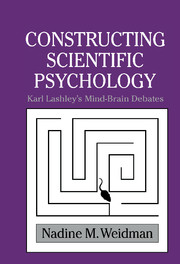Book contents
- Frontmatter
- Contents
- Preface
- Acknowledgments
- List of abbreviations
- Introduction
- 1 Lashley and Jennings: The origins of a hereditarian
- 2 Lashley, Watson, and the meaning of behaviorism
- 3 The pursuit of a neutral science
- 4 Neuropsychology and hereditarianism
- 5 Psychobiology and Progressivism
- 6 Psychobiology and its discontents: The Lashley-Herrick debate
- 7 Hull and psychology as a social science
- 8 Intelligence testing and thinking machines: The Lashley-Hull debate
- 9 Pure psychology
- 10 Public science and private life
- 11 Genetics, race biology, and depoliticization
- Epilogue: Lashley and American neuropsychology
- Appendix: Archives holding Lashley material
- Bibliography
- Index
Introduction
Published online by Cambridge University Press: 16 September 2009
- Frontmatter
- Contents
- Preface
- Acknowledgments
- List of abbreviations
- Introduction
- 1 Lashley and Jennings: The origins of a hereditarian
- 2 Lashley, Watson, and the meaning of behaviorism
- 3 The pursuit of a neutral science
- 4 Neuropsychology and hereditarianism
- 5 Psychobiology and Progressivism
- 6 Psychobiology and its discontents: The Lashley-Herrick debate
- 7 Hull and psychology as a social science
- 8 Intelligence testing and thinking machines: The Lashley-Hull debate
- 9 Pure psychology
- 10 Public science and private life
- 11 Genetics, race biology, and depoliticization
- Epilogue: Lashley and American neuropsychology
- Appendix: Archives holding Lashley material
- Bibliography
- Index
Summary
The question at the heart of this study has a history of more than two thousand years; while it has invited solution after solution, it never seems to get solved. How is “the marvellous phenomenon of the mind” produced from “the enigmatic three-pound mass of tissue known as the brain”? How can chemicals, cells, electrical signals – in short, matter – give rise to our consciousness, our thoughts, dreams, hopes and fears? How can two such different categories of existence bear any relationship to each other, much less be born, live, and die together?
Why the mind-body problem has remained so peculiarly intransigent despite repeated attacks is in itself a question worthy of consideration; that it continues to invite attacks cannot be disputed. In his recent book Consciousness Explained, Daniel Dennett asked, “how could the brain be the seat of consciousness?” and then proceeded to give the following answer:
It turns out that the way to imagine this is to think of the brain as a computer of sorts. The concepts of computer science provide the crutches of imagination we need if we are to stumble across the terra incognita between our phenomenology as we know it by “introspection” and our brains as science reveals them to us.
- Type
- Chapter
- Information
- Constructing Scientific PsychologyKarl Lashley's Mind-Brain Debates, pp. 1 - 17Publisher: Cambridge University PressPrint publication year: 1999

